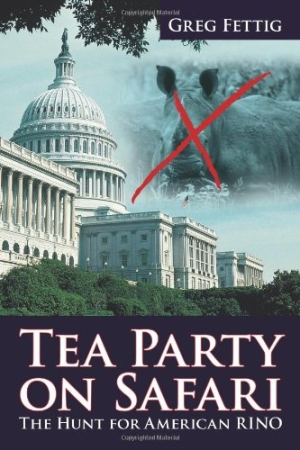Tea Party on Safari
The Hunt for American RINO
After the 2012 US election, Al Cardenas, the head of the American Conservative Union, was quoted as saying, “Our party needs a lot of work to do if we expect to be competitive in the near future.”
This sentiment has been bubbling below the surface of conservative politics for a while. Voters are tired of supporting politicians who promise conservative action during elections but then fail to follow through after they win. Greg Fettig is one of these disgruntled voters, and he shares his views in his new book, Tea Party on Safari: The Hunt for the American RINO.
Fettig’s tale begins when six-term Senator Richard Lugar of Indiana announces that he plans to vote to confirm liberal nominee Elena Kagan to be a Supreme Court justice. Frustrated, Fettig and fellow Tea Party compatriot Monica Boyer decide that enough is enough. In their eyes, Luger’s actions show that he is a RINO, a Republican in name only. They begin a campaign to ask Luger to step down. In doing so, they find that driving a grassroots movement isn’t easy, particularly when entrenched interests are ready to dismiss them.
Fettig’s chronicle doesn’t spout mere ideology. Like many conservatives, he is tired of the gloss and lack of substance that he feels is all too common among conservative politicians. When a critic states that “whoever is able to harmonize [the Tea Party] into one force would be kingmaker,” Fettig retorts, “our movement is not interested in making kings; on the contrary, our forefathers fought and died to unshackle themselves from a tyrannical king.”
Such statements reveal that Fettig is willing to change the way that politics is played—even when others aren’t. In another part of his book, he describes how, while other committees were coming up with snarky slogans about Luger, Fettig and his colleagues agreed to treat the senator with respect—while at the same time asking him to step down.
Perhaps the only drawback of the book is that it focuses on one victory in modern American politics—not a presidential election, but a primary win. Because of that, Tea Party on Safari might get lost in the flood of political books currently on the market. But this is a book that political junkies, historians, and even Tea Party activists might want to seek out. Even without the politics, it details what a grassroots movement has to do to gain traction in America. More importantly, it may someday be the first chapter in a history of how a few people changed American politics forever.
Reviewed by
Katerie Prior
Disclosure: This article is not an endorsement, but a review. The publisher of this book provided free copies of the book and paid a small fee to have their book reviewed by a professional reviewer. Foreword Reviews and Clarion Reviews make no guarantee that the publisher will receive a positive review. Foreword Magazine, Inc. is disclosing this in accordance with the Federal Trade Commission’s 16 CFR, Part 255.

